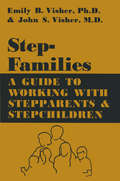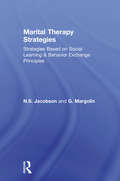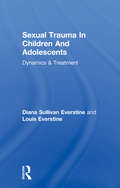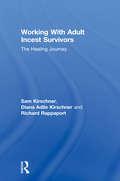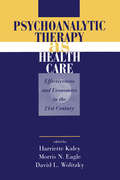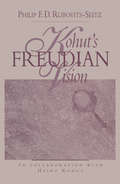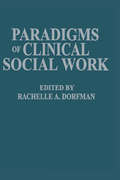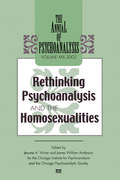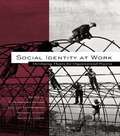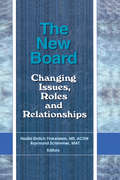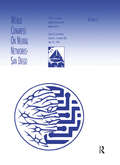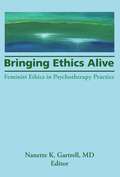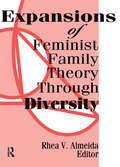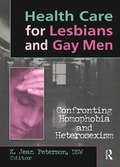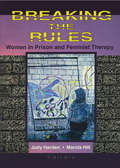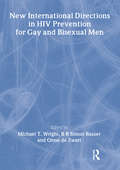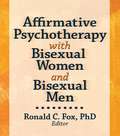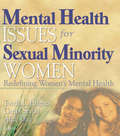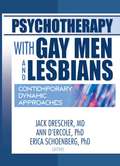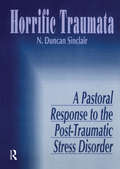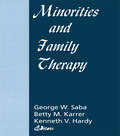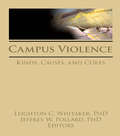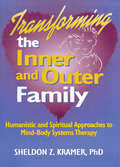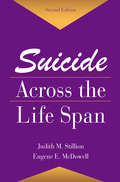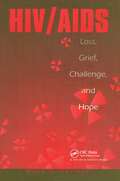- Table View
- List View
Stepfamilies: A Guide To Working With Stepparents And Stepchildren
by Emily B. VisherStudies the differences between stepfamilies and nuclear families, and the adjustments and stresses families face as a result of remarriage. Demonstrates numerous therapeutic models with techniques which may be used in individual or group therapy Special attention given to the problems of children in stepfamilies.
Marital Therapy Strategies Based On Social Learning & Behavior Exchange Principles
by N.S. Jacobson G. MargolinThe techniques described here are the familiar ones of establishing contracts and contigencies and training in communication and problem-solving skills. As the reader will see, these techniques are eminently teachable. The fact that they are described here and that they are teachable suggests that clinical technology has stepped forward a long way from the arcane mysteries which characterized psychotherapy efforts in the late 1950s and early 1960s. The aspect of this work which sets it clearly in the forefront is the emphasis upon soft clinical skills as being a necessary .
Sexual Trauma In Children And Adolescents: Dynamics & Treatment
by Louis Everstine Diana Sullivan EverstineThis book provides an overview of the problem of the molestation of children, and includes the issue of false accusations. It analyzes the subject of incest, and discusses both treatment and assessment.
Working With Adult Incest Survivors: The Healing Journey
by Sam Kirschner Diana Adile Kirschner Richard RappaportFirst published in 1993. Routledge is an imprint of Taylor & Francis, an informa company.
Psychoanalytic Therapy as Health Care: Effectiveness and Economics in the 21st Century
by Morris N. Eagle David L. Wolitzky Harriette KaleyIn Psychoanalytic Therapy as Health Care, a timely and trenchant consideration of the clash of values between managed care and psychoanalysis, contributors elaborate a thoughtful defense of the therapeutic necessity and social importance of contemporary psychoanalytic and psychodynamic approaches in the provision of mental health care. Part I begins with the question of where psychoanalytic treatments now stand in relation to health care; contributors offer explanations of the current state of affairs and consider possible directions of future developments. Part II looks directly at the conundrums that have resulted from the attempt to integrate psychotherapy and managed care, with contributors examining the ethical and legal dimensions of confidentiality, privacy, and reporting to third parties. Part III opens to wider consideration of the experiences of psychoanalysts under health care systems throughout the world. Finally, Part IV demonstrates the relevance of contemporary psychoanalytic approaches to a variety of contemporary patient populations, with contributors focusing on the applicability of analytically oriented treatment to AIDS patients, seriously disturbed young adults, and inner-city clinic patients. Collectively, the contributors to Psychoanalytic Therapy as Health Care convincingly refute the claim that psychoanalytically informed therapy is an esoteric treatment suited only to the "worried well." Drawing on a wide range of clinical and empirical evidence, they forcefully argue that contemporary psychoanalytic approaches are applicable to seriously distressed persons in a variety of treatment contexts. Failure to include such long-term therapies within health care delivery systems, they conclude, will deprive many patients of help they need - and help from which they can benefit in enduring ways that far transcend the limited treatment goals of managed care.
Kohut's Freudian Vision
by Philip F. Rubovits-SeitzHeinz Kohut was arguably the most influential modern day psychoanalyst. Because current interest in Kohut's work has focused so completely on self psychology, however, certain aspects of Kohut's thinking, in particular his nonreductive synthesis of Freudian theory, are in danger of being lost. Prior to his development of self psychology, Kohut was a legendary teacher of Freudian theory at the Chicago Institute for Psychoanalysis. In this volume, Philip Rubovits-Seitz presents Kohut's previously unavailable lectures from his course on psychoanalytic psychology (prepared in collaboration with Kohut himself) along with an illuminating summary statement on Freudian theory jointly written by Kohut and Rubovits-Seitz.Rubovits-Seitz continues with his own insightful analysis of Kohut's distinctive approach to Freudian theory. And he concludes by arguing persuasively why Kohut's later contributions should best be viewed as a continuation, rather than an abandonment, of this early vision. Kohut's Freudian Vision not only repairs an outstanding tear in received psychoanalytic history but also challenges self psychologists and contemporary Freudian psychoanalysts alike to renewed reflection.
Paradigms of Clinical Social Work
by Rachelle A. DorfmanThis fully-integrated volume written by the leading experts in the field of social work presents a wide rage of therapeutic paradigms. Especially noteworthy is the common framework provided for all paradigms discusse, thus facilitating comparison and contrast between each approach. These paradigms include cognitive, brief-oriented, and psychosocial therapies, as well as Adlerian theory and radical behavorism.
The Annual of Psychoanalysis, V. 30: Rethinking Psychoanalysis and the Homosexualities
by James W. Anderson Jerome A. WinerThe issue of same-gender sexual identity has challenged our understanding of psychological development and psychological intervention throughout the century just past and continues to provoke discussion in the century upon us. Over the past three decades, psychoanalysis advanced toward a contemporary perspective, which holds that the dynamics of sexual orientation must be an important element of the psychoanalytic process, but must be approached without prejudice regarding the outcome of analytic exploration of wish and desire. Taken together, the essays in Rethinking Psychoanalysis and the Homosexualities, a thematic volume of The Annual of Psychoanalysis, provide a developmentally grounded and clinically consequential enlargement of this basic premise. The result is a timely overview of contemporary approaches to the study of sexual orientation within psychoanalysis that highlights issues salient to clinical work with lesbian and gay patients. The section on "The Meaning of Sexualization in Clinical Psychoanalysis" demonstrates the importance of psychoanalytic study of same-gender desire and sexual orientation for analyst and analysand alike. Philips considers the analyst's own sexual identity as a factor shaping the analysand's experience of sexuality, whereas Shelby, Lynch, Roughton, and Young-Bruehl, from their various perspectives, address the problem of stigma and prejudice as they distort same-gender desire and same-gender sexual identity. Two concluding sections of the book explore the implications of a clinical psychoanalytic perspective for the study of gay and lesbian lives. Timely and essential reading for all mental health professionals, Rethinking Psychoanalysis and the Homosexualities underscores the profound distance traversed by psychoanalysis in arriving at its contemporary understandings of gender, sexual identity, and sexual desire.
Social Identity at Work: Developing Theory for Organizational Practice
by Daan Van Knippenberg S. Alexander Haslam Michael J. Platow Naomi EllemersSocial identity research is very much on the ascendancy, particularly in the field of organizational psychology. Reflecting this fact, this volume contains chapters from researchers at the cutting edge of these developments.
The New Board: Changing Issues, Roles and Relationships
by Mat Raymond Schimmer Nadia Ehrlich FinkelsteinMeet the challenge of coordinating effective board-staff teamwork! Using specific real-life examples and informed recommendations for board management, The New Board: Changing Issues, Roles and Relationships explains why and how to consider redesigning your board form and practice. The innovations suggested here, from minor adjustments to far-reaching reorganization, can help you find and keep board members, make board functioning more efficient, and help you comply with the new, stricter rules of managed care. The New Board informs the boards and staff of nonprofit residential service agencies about the nature of major contemporary challenges to board functioning. This innovative book offers an unusually diverse collection of contributors, including board members, executive staff, and academics. The resulting diversity of viewpoint produces a satisfying range of theoretical conversation and detailed description of actual practice. The New Board explores all the issues that affect boards in these days of rapid change: variations of board structures the pressures of managed care the increased complexity of service reduced board member availability the challenge of fund raising by modern boards contemporary considerations of legal liability of nonprofit boards The innovative ideas found in The New Board will help you and your nonprofit organization face the changes and challenges of the world of managed care. It is an essential resource for anyone interested in nonprofit organizations: CEOs and executive staff, academics and students in the field of nonprofit management, and board members themselves.
World Congress on Neural Networks: 1994 International Neural Network Society Annual Meeting (INNS Series of Texts, Monographs, and Proceedings Series)
by 1994 INTERNATIONAL NEURAL NETWORK SOCIETY ANNUAL MEETINGCentered around 20 major topic areas of both theoretical and practical importance, the World Congress on Neural Networks provides its registrants -- from a diverse background encompassing industry, academia, and government -- with the latest research and applications in the neural network field.
Bringing Ethics Alive: Feminist Ethics in Psychotherapy Practice
by Nanette GartrellGain fresh theoretical and practical perspectives of feminist ethics in psychotherapy from this groundbreaking book. The combined effect of increases in the population of minorities in the U.S. and the number of women in psychotherapy practice will have great impact on the future of the mental health profession. Psychotherapy practitioners and students must learn how to make ethical considerations concerning gender, ethnicity, and sexual orientation. Bringing Ethics Alive is the only book of its kind that deals with the multicultural aspects of ethics in mental health services and discusses specific objectives for incorporating ethics in psychotherapy education.Divided into two sections, Bringing Ethics alive focuses on both theoretical and practical issues of ethics in feminist therapy. The first section addresses theory by emphasizing the ethical responsibility of training programs to incorporate discussions on issues of racism, sexism, and heterosexism into the curricula. The important principles that should be included in courses on ethics in psychotherapy are outlined and include in-depth explanations of the ethics of confidentiality, professional competence, and conflicts of interest. A model for reconceptualizing boundary definitions in therapy is also provided.The second half of Bringing Ethics Alive provides insights on a wide range of ethical considerations in psychotherapy practice. Some of the specific issues discussed include: sexual abuse of clients by women therapists experiences of women sexually abused by male therapists compared to women sexually abused by female therapists a personal account of sexual misconduct in therapy from the point of view of the victim the ethics code of the Feminist Therapy Institute and the difficulties in translating the code into practice the inappropriate use of Native American spiritual practices or activities by non-Native American professionalsGraduate students in psychology, social work, and counseling, psychiatric residents, psychologists, social workers, counselors, and counseling clergy, no matter what their level of experience, will benefit from this thought-provoking exploration of feminist ethics in theory and practice. With its multicultural viewpoint and clear definitions of ethical issues, Bringing Ethics Alive is an essential book for helping mental health professionals sort through the complex issues of ethics in feminist therapy.
Expansions of Feminist Family Theory Through Diversity
by Rhea AlmeidaExpansions of Feminist Family Theory Through Diversity reconstructs feminist family therapy to include issues of race, class, gender, culture, and sexual orientation. The contributors assist you with creating possible solutions to mental health problems in all types of families. This will enable you to find specific working strategies to help solve the problems inherent in families of diversity. This book also provides you with several conceptual models for approaching the sociopolitical context of family therapy.This collection challenges family therapy as an existing context of power privilege and expands feminist principle and diversity into subject areas such as intimate violence among the racially and sexually different, heterosexual privilege in family life, homosexual and racial oppression, social inequalities within the therapeutic story, and, from Monica McGoldrick, reflections on self as viewed by the multiple social systems of oppression.Clinicians and practicing feminist therapists can find insight into many general topic areas relevant to daily practice, such as: race as a social construct culture in the context of race, class, gender, and sexual orientation assessment and treatment of violence in heterosexual and homosexual families a social critique of therapeutic inequalities addressing the social inequalities in the delivery of mental health the politics of privilege and privacy in family lifeExpansions of Feminist Family Theory Through Diversity is organized in a way that makes it central to all clinical practice. It can be used as a guidebook for family therapists, social workers, counselors (guidance, clergy, and counseling programs) and psychologists who deal with diverse families and their problems.
Health Care for Lesbians and Gay Men: Confronting Homophobia and Heterosexism
by K Jean PetersonHealth Care for Lesbians and Gay Men educates practitioners about the special needs of gay and lesbian patients and how to look critically at the impact of homophobia and heterosexism on the provision of care. It provides an overview of critical health care issues for lesbians and gay men and offers concrete suggestions to health practitioners and social workers on how to address these issues in order to guarantee the best care for their patients and clients. Authors in Health Care for Lesbians and Gay Men give health care providers and mental health workers practical interventions; suggestions for advocacy, social change, grassroots efforts, and alternative programs; and lessons about how to use existing procedures to more effectively meet the unique health care needs of gays and lesbians. Practitioners also learn how to utilize legal action in securing and protecting patients’and clients’personal health care wishes. Chapters in this book cover: how homophobia and negative attitudes can directly compromise the care given to lesbians and gay men. heterosexism and biases which exclude the partners of gay men and lesbians from participating in the care of their loved ones. legal issues and the need for legal recognition of gay and lesbian relationships, both to enhance the provision of care and for financial access to health care presently available to only heterosexual, married couples. legal protection and special legal documents that ensure that the wishes of gay men and lesbians are honored and the integrity of their relationships not violated.Health Care for Lesbians and Gay Men starts with special issues confronting adolescents and the special role health care providers can play in supporting the struggles of lesbian and gay adolescents. It then continues to look at these issues over the life cycle. Three themes emerge as authors try to explain problems and possible solutions for lesbians and gay men seeking health care: the pervasive homophobia and heterosexism found throughout the health care system and the impact these attitudes and beliefs have on the health care of lesbians and gay men; the need for education in professional programs on special health issues of gay men and lesbians; and the critical role that social workers can play in both educating others about the special needs of their gay and lesbian clients and in advocating for their clients in various health care settings.Health Care for Lesbians and Gay Men is essential reading for social work and social service practitioners and students working in the health care field, advanced undergraduates and graduate students of social work, professionals and students of nursing and medicine, and others concerned with the quality and equality of health care services. It urges students and professionals to challenge and evaluate their own attitudes, beliefs, and behaviors in order to ensure quality services to all clients and patients.
Breaking the Rules: Women in Prison and Feminist Therapy
by Marcia Hill Judith HardenBreaking the Rules: Women in Prison and Feminist Therapy challenges therapists, public policymakers, voters, and those in the criminal justice system to find treatment options, empowerment strategies, viable resources, community support, and policies that can help women with problems such as drug abuse, domestic violence, poverty, and prostitution rather than perpetually punishing them.Breaking the Rules shows you how our society makes ‘other’of those among us who are most vulnerable, injured, and without resources. It digs under your skin and forces you to look at: the histories of abuse among women who have murdered their partners the impact of race and ethnicity on patterns of mothering and caretaking of children of women prisoners the lack of treatment options for addicted women prisoners how prison reawakens the feelings of powerlessness in women who have suffered childhood physical and sexual abuse helping women inmates develop marketable educational and vocational skills, support systems, and positive perceptions of themselves collaborative strategies that challenge the status quo of programs and support available to female offenders and their families a relational model of treatment that is based on the integration of three theoretical perspectives the strengths and limitations of twelve step programs for womenMapping the problems and offering solutions, Breaking the Rules walks you through treatment strategies and self-confirming experiences--such as feminist therapy, prisoner-led support groups, affirmative prison programming, and art therapy--that help women draw on their strengths, come to terms with their pasts, and meet future challenges head on.
New International Directions in HIV Prevention for Gay and Bisexual Men
by Michael Wright B R RosserIt is widely recognized that current HIV intervention models are falling short of their goals. What are the alternatives?To answer this question, New International Directions in HIV Prevention for Gay and Bisexual Men presents a collection of articles from European and American authors that rival dominant paradigms of HIV prevention. Researchers, practitioners, and community organizations will be challenged to examine current assumptions and to consider neglected aspects of risk behavior such as love, trust, and the dynamics of sexual intimacy. New International Directions in HIV Prevention for Gay and Bisexual Men explores models and theories that will help you develop more effective HIV prevention programs to better serve patients and clients.New International Directions in HIV Prevention for Gay and Bisexual Men offers you fresh perspectives on prevention work by examining risk behaviors in the interactional, communal, and social contexts in which they are practiced. You will receive alternative explanations and reasons for HIV risk that go beyond current approaches and that introduce possibilities for new intervention strategies. Written by experts in the field, the chapters in New International Directions in HIV Prevention for Gay and Bisexual Men will give you insight into new ideas and developments, including: placing a greater emphasis on improving successful risk management strategies as opposed to quantifying risk factors examining the meaning and context of sexual acts which occur in casual encounters or steady partnerships and incorporating their relevancy into prevention work considering the effects that cultural context and socially constructed meanings have on prevention work and incorporating individuals’values and feelings into prevention strategies focusing on more realistic goals of harm reduction that take sexual decision making into consideration as opposed to expecting abstinence relating the various aspects of sexual encounters--physical attraction, intimacy, reciprocity, and power--to reasons why men choose not to use condomsExamining how gay men can underestimate the risk of HIV in order to meet needs of intimacy, New International Directions in HIV Prevention for Gay and Bisexual Men will help you understand the symbolic dimension of sexual contact. The normal, everyday reasons for having sex without a condom are explored, questioning models which often characterize unprotected sex as being the result of low self-esteem, substance abuse, or some other psychological vulnerability. Presenting data from both qualitative and quantitative research conducted at group and individual levels, this book reveals the complexity of risk behavior, the richness of sexual experience, and the importance of respecting the unique context in which gay men live their sexual lives. New International Directions in HIV Prevention for Gay and Bisexual Men will help you understand this point of view, enabling you to provide patients and clients with more effective HIV prevention and risk management services.
Affirmative Psychotherapy with Bisexual Women and Bisexual Men
by Ronald C. FoxLearn the latest practical-and bisexually affirmative-approaches to helping bisexual clientsClinical work with bisexual clients has conceptually shifted beyond the exclusive emphasis on either straight or lesbian and gay issues. There are still, however, too few psychotherapists who provide affirmative psychotherapy specific to bisexual concerns. Affirmative Psychotherapy with Bisexual Women and Bisexual Men addresses the issues of bisexuals with an accepting and affirmative perspective, providing therapists with the latest viewpoints, strategies, and research to effectively treat bisexual clients. Leading authorities with affirmative-to-bisexuals perspectives discuss problems specific to bisexuals and their lifestyles, with an eye toward providing practical, effective therapy. Unique bisexual lifestyle concerns are examined, such as transgender issues, polyamory, older bisexual women and men, and cultural differences, while providing an emphasis on cultivating well-being and a sense of community in bisexual clients.Affirmative Psychotherapy with Bisexual Women and Bisexual Men sensitively avoids the double standard long held by therapists clinically treating heterosexual or lesbian and gay individuals, showing that an affirmative viewpoint is valid and crucial for the effective treatment of bisexuals. This source clearly explains practical strategies and discusses the latest research on bisexual issues such as age, culture, heterosexual and bisexual mixed couples, and the polyamorous lifestyle with appropriate acceptance and understanding. The book also explores useful ways to develop successful health and support services specific to bisexual needs.Topics in Affirmative Psychotherapy with Bisexual Women and Bisexual Men include: affirmative psychotherapy techniques specific to bisexual women and bisexual men need for validation of bisexuality ways for clients to come to terms with their bisexuality practical value-and shortcomings-of the main therapeutic schools in providing effective psychotherapy transgender bisexuality, with illustrative case studies needs and issues of African-American bisexual clients bisexual aging issues counseling heterosexual spouses of bisexual women and men therapy approaches for clients who are bisexual and polyamorous recognizing and addressing the specific needs of different sub-groups of bisexual people and more! Affirmative Psychotherapy with Bisexual Women and Bisexual Men is a crucial addition to the literature of bisexual psychotherapy and is invaluable to counselors, psychotherapists, marriage and family therapists, social workers, psychiatrists, sex therapists, researchers, and educators in the fields of psychology, sociology, anthropology, sexuality, sex education, adolescent and adult development, and community mental health.
Mental Health Issues for Sexual Minority Women: Redefining Women's Mental Health
by Tonda Hughes Carrol Smith Alice DanGet a full understanding of lesbian mental health concerns! Mental Health Issues for Sexual Minority Women: Redefining Women's Mental Health presents much-needed research on sexual orientation and sexual minority populations missing from most mental health studies. This unique book identifies three areas of concern voiced in a 1999 Institute of Medicine report on lesbian health: whether lesbians are at a higher risk of mental health problems; the need for a better understanding of lesbian orientation and diversity in the lesbian population; and the need to eliminate barriers to mental health care services for lesbians. Mental Health Issues for Sexual Minority Women addresses those concerns with theoretical and empirical work that represents a broad range of disciplines and cultures. Mental Health Issues for Sexual Minority Women covers a unique and diverse range of topics missing from most books on lesbian health. The book includes original research on issues such as: body image and attitudes toward eating and dieting relationship satisfaction and conflicts substance use and sexual victimization risk factors for psychological distress among African-American lesbians and much more! Mental Health Issues for Sexual Minority Women also includes reviews of literature on traumatic victimization, internalized homophobia, and mental health issues for lesbians with physical disabilities. This groundbreaking book is a unique resource for health researchers, clinicians, academics, and students in any health profession, including nursing, medicine, public health, social work, psychology, and sociology.
Psychotherapy with Gay Men and Lesbians: Contemporary Dynamic Approaches
by Jack Drescher Ann D'Ercole Erica SchoenbergExamine gay and lesbian psychoanalysis from a variety of perspectives! Psychotherapy with Gay Men and Lesbians: Contemporary Dynamic Approaches presents case histories of psychotherapy sessions with gay and lesbian patients, focusing on today's psychoanalytical approaches. Dedicated to enhancing the emotional, psychological, and psychiatric treatment of gay men, lesbians, and bisexuals, the book features prominent analysts with a wide range of clinical and theoretical approaches. The foremost experts in the therapeutic field address issues affecting gay and lesbian patients from psychoanalytic perspectives that respect the patients' sexual identities. Psychotherapy with Gay Men and Lesbians reflects the significant clinical and theoretical changes therapists face in dealing with issues of gender and sexuality. New ways of thinking coexist with traditional theory as paradigm shifts in psychotherapy and psychoanalysis affect the treatment of gay, lesbian, and bisexual patients. This book provides a forum to address those changes through clinical papers and discussions. Psychotherapy with Gay Men and Lesbians includes discussion of case reports that deal with: gay therapists treating gay patients countertransferential enactments of sex and gender in treatment rethinking the meanings of homosexuality psychotherapeutic treatment of gay male patients with AIDS and much more! Psychotherapy with Gay Men and Lesbians is an essential forum for the exchange of clinical information on gay and lesbian psychotherapy. The book is a valuable resource for psychiatrists, psychologists, social work therapists, psychoanalysts, and anyone interested in today's psychoanalytic approaches to homosexuality.
Horrific Traumata: A Pastoral Response to the Post-Traumatic Stress Disorder
by William M Clements Norma J SinclairHorrific Traumata shares the stories of persons whose meaning, hope, and faith were ripped from them by others or traumatic events and who live with Post-Traumatic Stress Disorder. Since the Vietnam War, therapists have come to understand victims of severe emotional trauma with new understanding and, with better ability, have come to learn how to heal the awful effects of their traumas. Now the ranks of traumatized Vietnam veterans are joined by others who have also experienced horrific traumata and need help to rebuild their lives from Post-Traumatic Stress Disorder (PTSD)--victims and survivors of incest and rape, hostage situations, and other events outside the range of ordinary human suffering.Duncan Sinclair provides direct insight into the clinical and psychological aspects of PTSD. He presents a clear and workable understanding of the nature of PTSD which gives clergy and other involved persons direct insight into the causes of many behaviors. Horrific Traumata focuses on the church’s readiness and obligation to incorporate traumatized victims into the center of grace and healing. Clergy of all specialities now have a means of seeing behind the masks of hurt and isolation to the long-standing and disabling trauma. Sinclair shows how to promote the healing process through a range of parish activities as well as in clinical settings. Guidelines for promoting healing include the key concepts of how to listen compassionately and how to create safe places in which victims may heal during the rebuilding of hope and faith. Scriptures used throughout develop a hopefulness that must be maintained for healing. Based on the quintessential understanding that current life stressors open past wounds in ways that leave them open, Sinclair guides professionals and clergy in treating the whole traumatized person. Clergy of all specialities, pastors, chaplains, pastoral counselors, seminary students, clinical pastoral educators, and students will find healing words for hurting people in this book. Clinical specialists in all disciplines who wish to view clients’lives from a clinical and faith position will find the stories and clinical suggestions in this book to be a modern goldmine.
Minorities and Family Therapy
by Kenneth Hardy Betty Mackune-Karrer George SabaMinorities and Family Therapy highlights the work of experienced, sensitive clinicians who, along with minority families, have found creative solutions to the problems minority families present. Until now, the field of family therapy has paid little attention to the specific clinical needs and strengths of minority families. Without sufficient exploration and training, family therapists risk treating minority families from a narrow, incomplete perspective, filtering out their inner resources, values, legacies, history, and wisdom, and underestimating the influence of the social settings in which they live. This unique and highly valuable book explores how systems-oriented clinicians presently work with ethnic and racial minority families. The chapters cover a wide range of clinical issues including pitfalls of misunderstanding and discrimination, innovative strategies for treating drug abuse and AIDS, and skills needed in caring for particular minority groups, such as Native Americans, blacks, Latinos, and Asian Americans. The authors go beyond simply spelling out cultural similarities and differences. They provide clear, clinical suggestions to be applied in family and community contexts. Not just another book on ethnicity, Minorities and Family Therapy looks at families who, because of their race and cultural background, have had to struggle with racism, discrimination, limited access to health care, economic bankruptcy, and educational barriers. Written for family therapists and health care providers who work with minority families and look for creative alternatives to improve their care, this landmark volume is a celebration of the strengths that minority families demonstrate in coping with long-term adversity.
Campus Violence: Kinds, Causes, and Cures
by Leighton Whitaker Jeffrey PollardThis timely book shows how the rapidly increasing phenomenon of violence in the U.S. is invading college and university campuses. Campus Violence shows what colleges, universities, and other schools can do to deconstruct the violence culture and begin to educate for a better society. The chapters assist educators in determining the nature of both external and internal violence and what to do about it. Readers will benefit from the experiences of many institutions of higher learning as communicated by various outstanding contributors to this book. By becoming sharply aware of the issues and solutions, administrators may engage in better, more realistic long-range planning, as well as get help for the myriad daily questions and problems inherent to running today’s campuses.As a whole, the book is devoted to highlighting important kinds, causes, and cures of violence destructive to living and learning opportunities. The contributors address the full range of issues from conceptualization to practical ways of handling violent behaviors. Section I: Addresses the broadest, most far-reaching views of campus violence: the conceptualization of campus violence, administration perspectives, the destructive concoction of alcohol and other drugs and morbidity, and the commercial promotion of mindless violence. Section II: Addresses specific kinds of violence. Section III: Focuses on the most frequent immediate perpetrators--male college students--and how their behavior can be dealt with and improved. Section IV: Focuses very specifically on how the college counselor or psychotherapist can be a consultant to staff and faculty in regard to disruptive students.Campus Violence depicts the need to nurture and develop atmospheres for learning, respect, and constructive action--arguably the most pressing topic in education today. Counselors, therapists, security officers, deans, and presidents can begin to counter the rapidly increasing phenomenon of violence in American colleges and universities and cultivate a positive leadership atmosphere. The implications of the contributing authors reach to the primary and secondary schools in our nation--the training grounds for college life and education--and provoke some questions which begin to create a better learning environment.
Transforming the Inner and Outer Family: Humanistic and Spiritual Approaches to Mind-Body Systems Therapy
by E Mark Stern Sheldon Z KramerThis enlightening book integrates humanistic and transpersonal psychotherapy principles with family systems work. Transforming the Inner and Outer Family discusses a wide range of creative methodologies, such as the use of meditation, guided imagery, and energy centers in the body to bridge the inner and outer experiences of the individual and family members. Chapters explore the healing capacity of intense affect to unify significant others through the transformation of fear, anger, and grief to understanding, compassion, love, and forgiveness. The book is practical as well as theoretical, containing many case studies focusing on individual, couples, and family therapy. In addition, a special chapter is included on the use of family of origin sessions. Transcripts of actual cases show detailed methods of entering into the therapy system to promote change and demonstrate the operational definition of spirituality and its practical utilization in psychotherapy. Also included is a special candid interview between the author and Virginia Satir, mother of family therapy, nine months before she died, on her personal and professional life.Transforming the Inner and Outer Family presents an integrative family systems model that emphasizes the coordination of existential, humanistic, and transpersonal healing psychologies. This model coordinates Virginia Satir’s later thinking with Roberto Assagioli’s model of psychosynthesis. Author Sheldon Kramer blends principles of psychosynthesis with family systems work and thoroughly explains the use of his new model, Mind-Body Systems Therapy,™ including: development of internal family configurations the spiritual dimension within the systemic context integrating the use of the body with meditation in healing practices methods of healing the inner nuclear and intra-generational family bridging the inner and outer familial world stages of inner and outer healing the use of self in therapyTransforming the Inner and Outer Family is on the cutting edge of current emerging interests in alternative medicine, especially in holistic principles of healing, with emphasis on the spiritual dimension as a major healing conduit for transformation. Readers will discover in this book a solid theoretical base that integrates traditional psychology, including psychodynamic/object relations theory, with less-mainstream forms of psychotherapy, and will learn effective strategies for helping individuals, couples, and families heal.
Suicide Across The Life Span: Premature Exits (Death, Education, Aging and Health Care)
by Judith M. Stillion Eugene E. McDowellFirst published in 1996. The complexities of suicide are examined from the developmental viewpoint. The text includes appropriate case studies, and three research studies, which were conducted especially for this work.
Hiv/Aids: Loss, Grief, Challenge And Hope
by Mary O'DonnellFirst published in 1996.This guide for professionals who are working in the complex area of HIV/AIDS provides practical guidance and solutions. Each chapter describes specific needs and solutions based on the options available and personal choice.
